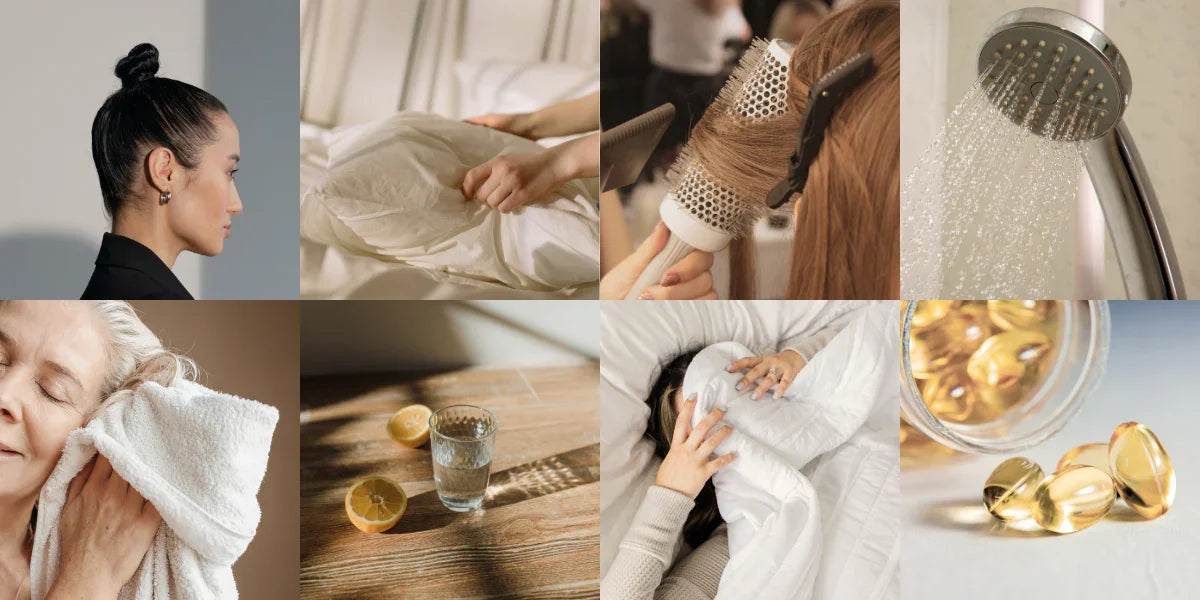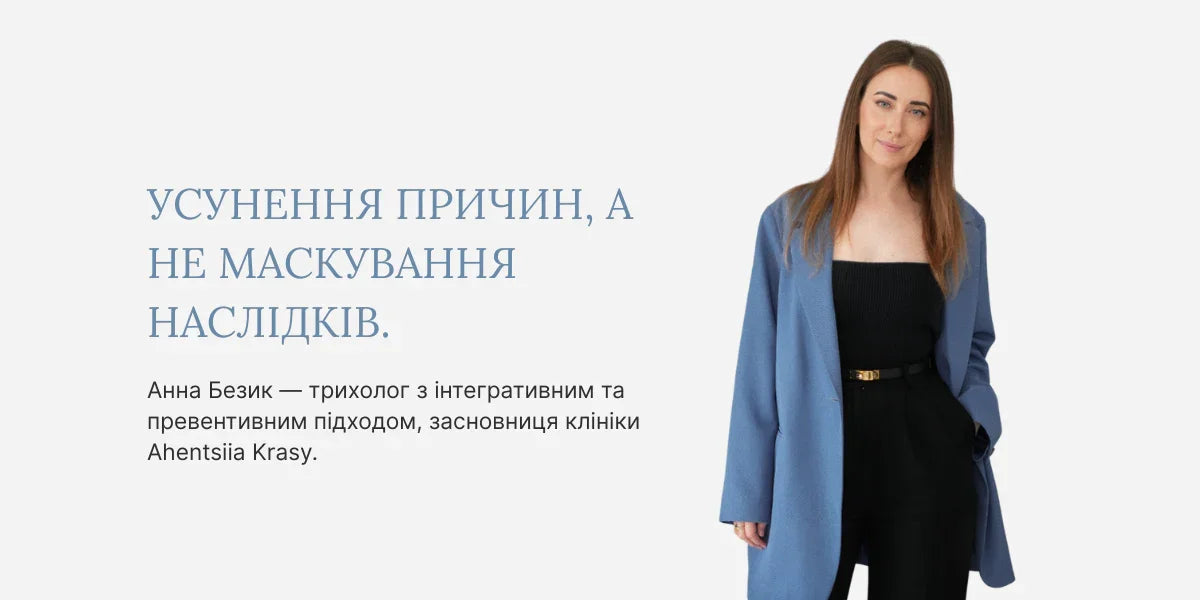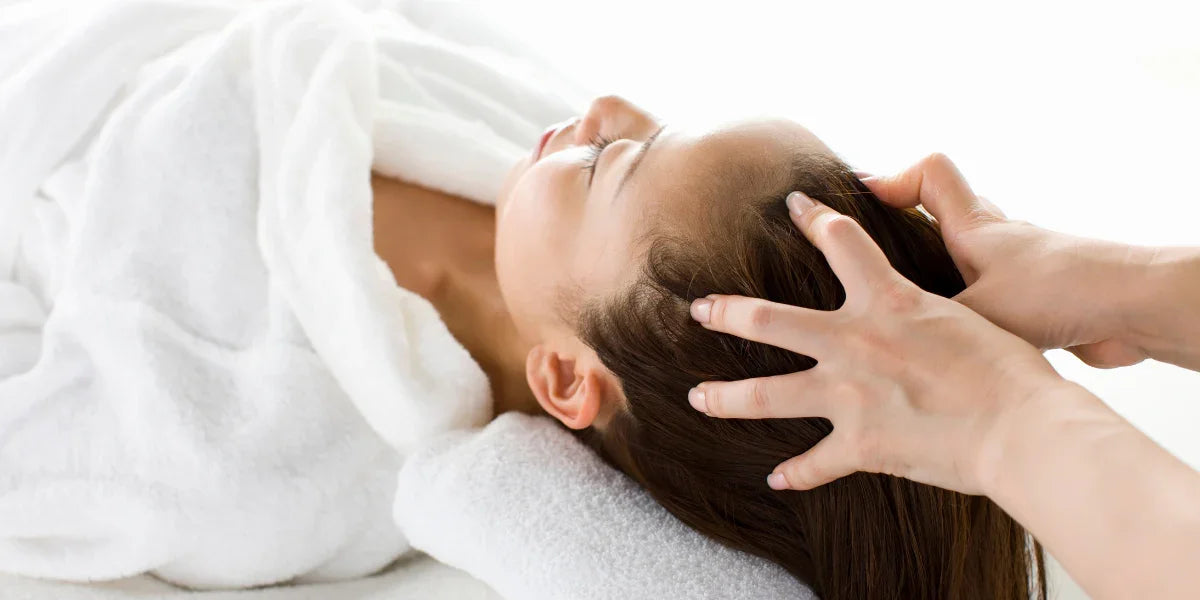
13 Habits That Ruin Your Hair Every Day
(even if you don't notice it)
It's easy to want thick and long hair, but taking care of it is an art. In this article, we analyze the bad habits that gradually spoil your hair's health.
Sometimes we do everything “right”: we buy high-quality shampoo for our scalp type, visit a trichologist, apply masks and conditioners to wet hair, and yet it is still dull, brittle, falls out and grows slowly. The reason may be hidden in habits that we don't even consider harmful.
Systemic damage works slowly but surely.
To avoid this, it is important to understand what exactly we are doing wrong.
Behavioural habits: it all starts with the hands.
1. Frequent touching of hair.
Fixing a strand, twisting a curl on your finger, tucking a hair behind your ear - it seems like nothing serious, but frequent contact of hair with your hands contaminates it, stimulates oily scalp, and causes mechanical damage to the ends.
2. Hair pulling or curling the ends of the hair on the finger.
Regular nervous hair movements is a habit that not only shows your anxiety, but also damages the ends, causes breakage and affects the thickness.
Grooming habits - from extreme to extreme.
1. Untimely or rare washing.
You need to wash your hair on time - no less often and no more often than your hair needs it. Some people's scalp gets greasy quickly, so daily washing is the norm. For others, once every few days is enough.
Too little washing can lead to clogged follicles, skin irritation, and hair loss, so look for your golden mean. On average, this is 1-3 times a week, but the real schedule is the one that works for you.
2. Use of hot water.
Hot water dehydrates the hair, makes it brittle and deprives it of shine. It is better to wash your hair with warm water and rinse it with cool water afterwards - this “glues” the cuticle (minimizes the hair scales on its surface).
3. Towel drying.
Wrapping hair in a towel, friction, “squeezing” water out of the hair is a habit that damages the hair structure.
Rough friction with a towel damages the top layer of the hair - the cuticle, making the hair fluffy, brittle and prone to split ends.

Terry towel structure.
A heavy towel wrapped around the head puts additional stress on the hair follicles, especially if the hair is wet (at this point it is most vulnerable). This can cause the roots to weaken and even fall out.
A quality alternative that will help maintain hair health and length is the MOLODO silk turban, which is recommended by trichologists.
The only silk turban by MOLODO.
Styling habits: beauty with a side effect.
1. Frequent use of stylers without thermal protection.
Tongs, curling irons, hair dryers - hot tools destroy the protein structure of the hair. If you can't imagine your life without styling, use thermal protection - it's a must-have in your beauty routine.
2. Overuse of hairspray, dry shampoo and volume powder.
These products create a film on the hair and scalp that can clog pores, cause irritation and weaken follicles.
The hairstyles you probably love are more harmful.
1. Tight ponytails and braids
Regularly wearing tight hairstyles can cause traction alopecia, a gradual loss of hair due to tension. This is especially noticeable on the temples and forehead.

Tight ponytail example. Photo from Harper's BAZAAR.
Even in a hairstyle, every hair needs space.
2. Constant use of elastic bands with metal inserts.
These accessories can break hair at the point of contact. Choose natural soft silk bands that hold the hair securely but do not put pressure on the hair.
Nighttime habits: you sleep and your hair suffers.
1. Sleeping with wet hair.
Wet scalp and wet hair are vulnerable. You turn over, your hair rubs against the pillow, and the cuticle gets injured. The result is split ends and breakage.
Excessive moisture and heat create favorable conditions for disrupting the microbiome - the delicate balance of “beneficial” and “harmful” microorganisms on the scalp. As a result, itching, irritation, dandruff, seborrheic dermatitis, or even fungal infections can occur.
According to dermatologist Dr. Leona Yip of Brisbane Skin Partners, going to bed with wet hair = problems. “You're essentially retaining moisture, which can affect the integrity of the scalp barrier,” says Dr. Yip.
She explains that an exacerbation of the microbiome imbalance causes the resident Malassezia yeast and Staphylococcus bacteria to grow in greater numbers on the scalp. “All of these can lead to scalp problems such as dandruff, seborrheic dermatitis, folliculitis, and acne,” says Dr. Yip.
Don't go to bed until you've blow-dried your scalp and hair.
2. Cotton pillowcase.
Yes, regular fabric creates friction, which leads to breakage and tangles. The best option is a silk pillowcase, which takes care of your hair (and your skin, too!), minimizes the appearance of breakage and split ends. It also enhances the natural shine of the hair.
Important fact: Silk pillowcase is 30% less absorbent to moisture and skincare products, so your evening care doesn't stay on your pillow, but works with your neck and face.
Your lifestyle has an impact.
1. Lack of sleep and stress.
Chronic stress blocks hair growth, affects hormonal levels, which provokes hair loss. Stable sleep and rest is not just a “trendy” thing to do, it's really important for your health.
2. Vitamin and water deficiency.
What we consume directly affects the condition of our hair. Hair is not a vital organ so the body sends nutrients to it last. If something is missing, hair is the first to suffer.
Iron deficiency can lead to weakening of follicles and hair loss, as iron is responsible for oxygenation of cells. A lack of this trace element is often accompanied by increased daily hair loss and slower hair growth.
Biotin is essential for the synthesis of keratin, the main building block of hair. Its deficiency can lead to brittle, dry and shiny hair.
Zinc regulates the sebaceous glands and tissue repair, so its deficiency is often accompanied by flaky scalp and reduced hair growth.
Omega-3 fatty acids nourish the follicles from the inside, maintaining hair elasticity and shine. Their deficiency can be associated with hair and eyebrow loss.
Dehydration can cause hair to become dry, dull and prone to breakage. Water makes up a significant part of the hair structure, and not getting enough of it can negatively affect its health.
Recommendations:
- Drink enough water every day (approximately 30 ml per 1 kg of body weight).
- Eat a balanced diet, including foods rich in iron, biotin, zinc, and omega-3 fatty acids.
- If necessary, see your doctor for blood tests and dietary adjustments.
Change your habits - change your hair!
 MOLODO sleep mask to support your habit of quality rest.
MOLODO sleep mask to support your habit of quality rest.
How to get rid of bad hair habits?
Even if you recognize yourself in a few of these points, it's not a problem. The good news is that bad habits can be changed. The main thing is to do it gradually, regularly and consciously.
Here are 5 simple but effective ways:
1. The “one replacement” method.
Instead of fighting the habit directly, replace it with another one.
- When you touch your hair, take a deep breath or do something else with your hands.
- Instead of a tight ponytail, braid it lightly.
2. Rule of Reminders.
Use stickers, reminders on your phone, on the mirror, on the refrigerator, so you don't forget what you want to change.
3. Habit Tracker.
Download one of the apps habit tracker app: Habit, Fabulous, or Notion and check off new steps each day: No styler - plus! I washed my hair with warm water - another plus!
4. 21-day rule.
Forming a new habit takes an average of three weeks. Give yourself time. Small steps every day are better than radical changes once a year.
“Our self-esteem and our habits tend to go hand in hand. Change one and you will automatically change the other.”
Psychocybernetics, 1960. Dr. Maxwell Maltz, a plastic surgeon turned psychologist.
5. Positive reinforcement.
Reward yourself for your progress: a new hair mask, a relaxing bath, or a trip to your favorite nail technician for a beauty treatment is a good way to keep you motivated and on track.
Conclusion
Habits are not a sentence. They are mechanisms that can be rewritten. And the best investment you can make in your hair's health is to pay attention to yourself and your daily actions.
Healthy hair is the result of constant attention and gentle care. And yes, sometimes the best thing you can do is just leave it alone: don't touch it with your hands, don't towel dry it, don't sleep on a regular pillowcase. It has a memory, and every balanced and gentle decision you make today has a direct proportional effect on the future long-term effect of healthy, thick and full hair.
Choose silk bestsellers for your home beauty routine in the MOLODO Store. Only 100% natural Mulberry silk and handmade.
Here's What You'll Love!
YouTube MOLODO Talks: discussing everything important about hair with a trichologist.
Part 1: What to do to have thick and healthy hair? About hair loss, SPF protection and home care.
Part 2. The benefits and harms of mesotherapy, plasma therapy, minoxidil, and hair laser.






